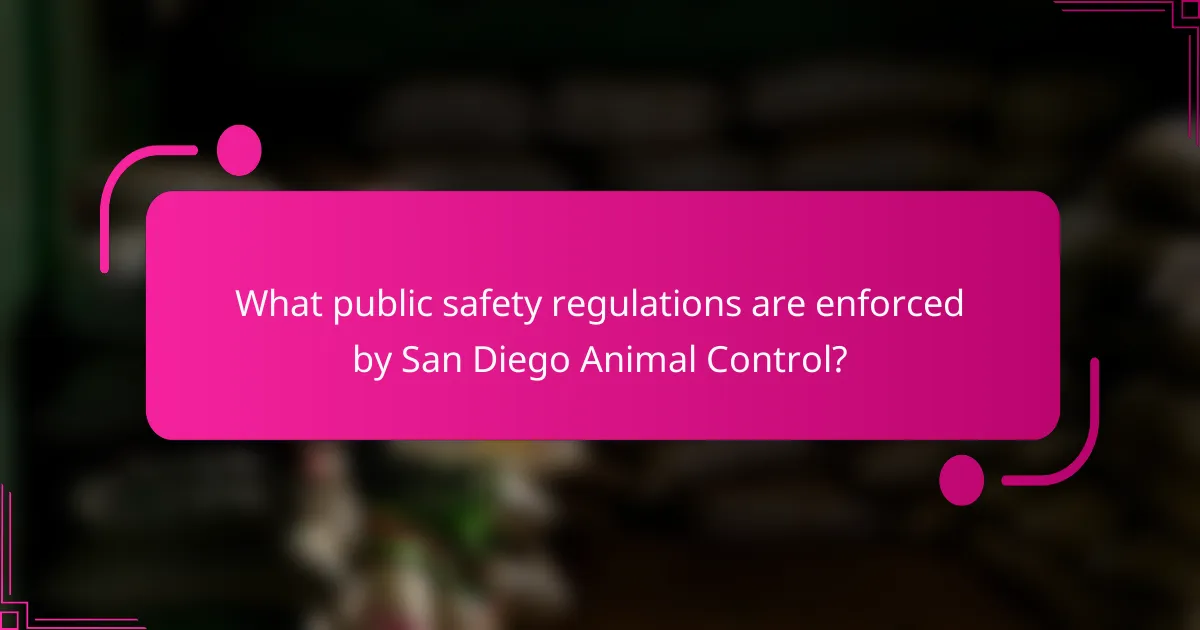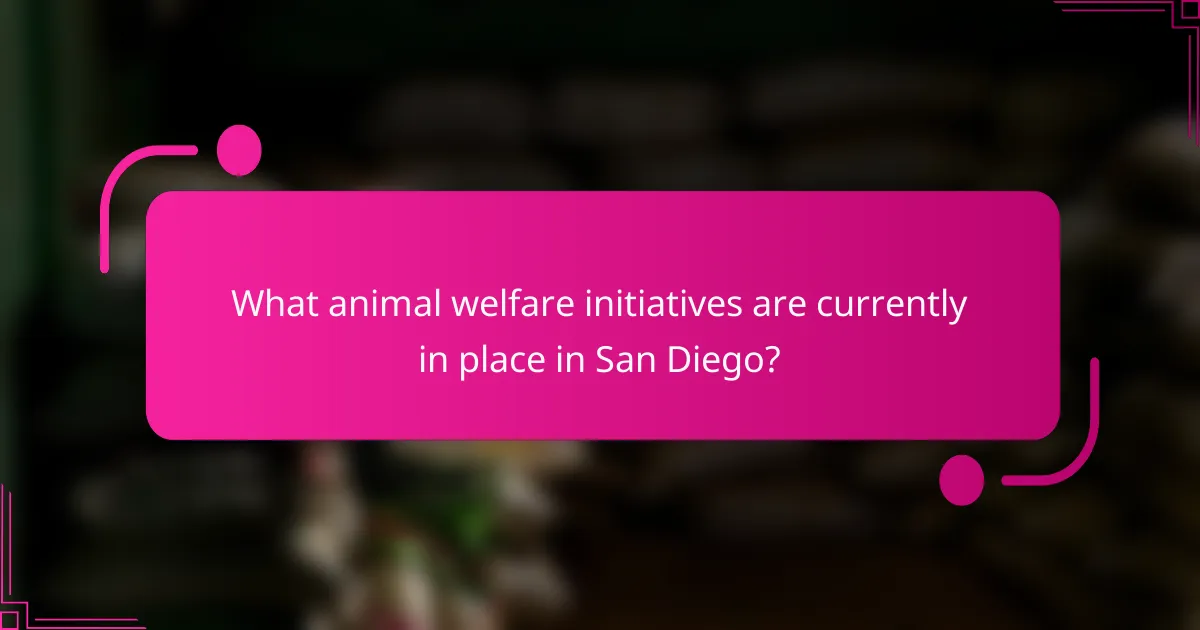
What is San Diego Animal Control?
San Diego Animal Control is a division of the City of San Diego that manages animal-related issues. This includes enforcing laws regarding pet ownership and animal welfare. The division also responds to reports of stray animals and animal cruelty. Additionally, San Diego Animal Control provides resources for pet licensing and adoption. They work to ensure public safety and promote responsible pet ownership. The division operates under the guidelines set by local and state regulations. Their efforts contribute to the overall welfare of animals in the community.
How does San Diego Animal Control operate within the community?
San Diego Animal Control operates by enforcing local animal laws and regulations. They manage issues related to stray animals, animal cruelty, and public safety. The department conducts regular patrols and responds to calls from the community. They also provide education on responsible pet ownership. Animal Control facilitates the licensing of pets to ensure compliance with local laws. The department partners with local shelters for animal adoptions and rescues. They offer resources for lost and found pets to help reunite them with their owners. Additionally, they implement spay and neuter programs to control the animal population.
What are the primary responsibilities of San Diego Animal Control?
San Diego Animal Control is responsible for enforcing animal-related laws and regulations. They manage stray and abandoned animals in the city. This includes capturing and impounding animals that are found roaming without owners. The agency also investigates reports of animal cruelty and neglect. They provide education on responsible pet ownership and animal welfare. Additionally, San Diego Animal Control facilitates pet adoptions to reduce the number of homeless animals. They work to ensure public safety through rabies vaccinations and licensing of pets. These responsibilities help maintain community health and safety while promoting humane treatment of animals.
How does San Diego Animal Control ensure public safety?
San Diego Animal Control ensures public safety through various enforcement and educational initiatives. They respond to animal-related emergencies and enforce local animal laws. This includes investigating reports of dangerous animals and ensuring compliance with licensing requirements. Their team conducts regular patrols and inspections to monitor animal welfare. They also provide public education on responsible pet ownership and safety measures. These efforts help reduce the risk of animal-related incidents in the community. Additionally, they collaborate with local organizations to promote awareness about animal safety. This comprehensive approach supports a safer environment for both residents and animals.
Why is animal welfare important in San Diego?
Animal welfare is important in San Diego because it promotes the humane treatment of animals and enhances public safety. Ensuring animal welfare reduces the risk of animal-related incidents, such as attacks or injuries. San Diego has a diverse population of pets and wildlife, making responsible animal care essential. The city has enacted laws and initiatives to protect animals from neglect and abuse. For instance, the San Diego Humane Society works to educate the public on responsible pet ownership. Additionally, animal welfare contributes to community health and well-being. Studies have shown that communities with strong animal welfare programs experience lower rates of animal cruelty. Thus, prioritizing animal welfare supports both animal rights and public safety in San Diego.
What initiatives does San Diego Animal Control implement for animal welfare?
San Diego Animal Control implements various initiatives for animal welfare. These include spay and neuter programs to reduce pet overpopulation. They also conduct adoption events to find homes for abandoned animals. Educational outreach is provided to inform the public about responsible pet ownership. The agency enforces animal cruelty laws to protect vulnerable animals. Additionally, they offer resources for pet owners in need, such as food assistance. These initiatives aim to promote the health and safety of both animals and the community.
How do these initiatives impact the local community?
These initiatives enhance public safety and promote animal welfare in the local community. They reduce the number of stray animals, which can pose risks to public health. Increased adoption rates lead to fewer animals in shelters, benefiting both animals and residents. Community engagement in these initiatives fosters a sense of responsibility among pet owners. Educational programs raise awareness about responsible pet ownership. Statistics show that areas with strong animal control measures experience lower rates of animal-related incidents. Overall, these initiatives contribute to a healthier, safer environment for both residents and animals.

What public safety regulations are enforced by San Diego Animal Control?
San Diego Animal Control enforces several public safety regulations. These include leash laws requiring dogs to be leashed in public spaces. They also regulate pet licensing to ensure all pets are registered. Additionally, there are regulations against animal cruelty and neglect. The agency enforces noise ordinances related to barking dogs. They also manage dangerous dog laws to protect the community. Furthermore, San Diego Animal Control conducts inspections and responds to reports of unsafe animal conditions. These regulations help maintain public safety and promote responsible pet ownership.
How are dangerous animals managed in San Diego?
Dangerous animals in San Diego are managed through a combination of regulations and public safety initiatives. The San Diego Animal Control enforces laws that require permits for owning certain dangerous species. These laws include guidelines for housing, handling, and care to minimize risks to the public. Animal control officers respond to reports of dangerous animals and conduct investigations. They can issue citations or confiscate animals when necessary. Additionally, the city provides educational resources to inform the public about safe interactions with wildlife. Regular inspections ensure compliance with safety standards. These measures help protect both residents and animals in the community.
What procedures are in place for reporting dangerous animals?
To report dangerous animals, individuals should contact local animal control authorities. In San Diego, this is typically done by calling the city’s Animal Control Division. Reports can also be made through the city’s official website or by visiting local animal shelters. It is crucial to provide specific details about the animal, including its location and behavior. This information helps authorities assess the situation effectively. Timely reporting is essential for public safety and animal welfare. The city has established these procedures to ensure quick response and resolution of dangerous animal incidents.
How does San Diego Animal Control respond to reports of dangerous animals?
San Diego Animal Control responds to reports of dangerous animals by dispatching officers to assess the situation. Officers evaluate the threat level posed by the animal. They may capture the animal if it is deemed a danger to public safety. The department follows specific protocols outlined in local ordinances. These protocols include documenting the incident and taking appropriate action based on the animal’s behavior. In some cases, they may issue citations or warnings to the animal’s owner. Public safety is the primary concern during these responses. The department aims to resolve incidents quickly and effectively to ensure community safety.
What are the leash laws and licensing requirements in San Diego?
In San Diego, leash laws require dogs to be on a leash no longer than six feet when in public areas. The leash must be held by a person capable of controlling the dog. Off-leash areas are designated in certain parks, but dogs must still be under voice control. Licensing requirements state that all dogs over four months old must be licensed with the City of San Diego. Licenses must be renewed annually, and proof of rabies vaccination is required for licensing. Failure to comply with leash laws can result in fines. Additionally, unlicensed dogs may incur penalties as well.
What are the specific leash laws for pet owners in San Diego?
In San Diego, pet owners must keep their dogs on a leash in public areas. The leash must not exceed six feet in length. Off-leash areas are designated in specific parks. Owners must maintain control of their pets at all times. Failure to comply can result in fines. San Diego Municipal Code Section 63.0102 outlines these regulations. It emphasizes public safety and animal welfare. These laws help prevent accidents and ensure responsible pet ownership.
How can pet owners ensure compliance with licensing requirements?
Pet owners can ensure compliance with licensing requirements by understanding local laws. They should familiarize themselves with the specific licensing regulations in San Diego. This includes knowing the types of pets that require licenses and the associated fees. Pet owners must also keep their pet’s license current by renewing it annually. Additionally, providing accurate information during the licensing process is essential. This includes details about the pet’s breed, age, and vaccination status. Pet owners can check with the San Diego Animal Control for updates on licensing requirements. Following these steps helps avoid fines and ensures pets are legally registered.

What animal welfare initiatives are currently in place in San Diego?
San Diego has several animal welfare initiatives aimed at protecting and improving the lives of animals. The San Diego Humane Society runs programs for pet adoption and spay/neuter services. They provide education on responsible pet ownership and animal care. The city also enforces laws against animal cruelty and neglect. Additionally, there are community outreach programs promoting the welfare of stray and feral animals. The Animal Services Division offers resources for lost pets and pet licensing. These initiatives reflect the city’s commitment to animal welfare and public safety.
How does San Diego Animal Control promote adoption and rescue?
San Diego Animal Control promotes adoption and rescue through various initiatives. They host adoption events regularly to connect potential pet owners with animals in need. Their website features profiles of adoptable pets, showcasing their characteristics and needs. They collaborate with local shelters and rescue organizations to increase visibility for animals. Educational programs inform the public about the benefits of adoption and responsible pet ownership. Additionally, they provide incentives like reduced fees for adopting pets. These efforts aim to reduce the number of animals in shelters and encourage community involvement in animal welfare.
What programs are available to facilitate pet adoption?
Programs available to facilitate pet adoption include local animal shelters, rescue organizations, and adoption events. San Diego Animal Control operates the Animal Services Division, which manages pet adoption efforts. The San Diego Humane Society also runs various adoption programs. These programs often include reduced fees for adopting pets. Events such as “Clear the Shelters” promote adoption awareness. Community partnerships enhance outreach and accessibility for potential adopters. Online platforms allow users to view available pets. These initiatives aim to reduce the number of homeless animals in the region.
How does San Diego Animal Control collaborate with local shelters?
San Diego Animal Control collaborates with local shelters to enhance animal welfare. They share resources and information to facilitate adoptions. Animal Control assists shelters by providing stray animal services. They also coordinate efforts during emergencies, such as natural disasters. This partnership helps to reduce overcrowding in shelters. Additionally, they work together on community outreach programs. These initiatives promote responsible pet ownership and education. Collaboration ultimately improves the overall welfare of animals in the San Diego area.
What educational programs are offered by San Diego Animal Control?
San Diego Animal Control offers various educational programs aimed at promoting animal welfare and responsible pet ownership. These programs include community workshops on pet care and training. They also provide school presentations to teach children about animal safety. Additionally, San Diego Animal Control conducts outreach events to raise awareness about local animal laws. These initiatives are designed to enhance public knowledge and encourage responsible behavior towards animals.
How do these programs benefit the community?
These programs benefit the community by enhancing public safety and promoting animal welfare. They reduce the number of stray animals, which can pose health risks. By providing resources for responsible pet ownership, they encourage vaccination and spaying or neutering. This leads to lower rates of animal-related incidents and improved community health. Additionally, these initiatives foster partnerships between residents and local organizations. They create awareness about animal rights and responsible care. Community engagement through educational programs strengthens the bond between humans and animals. Overall, these efforts contribute to a healthier, safer, and more compassionate community.
What topics are covered in these educational initiatives?
Educational initiatives in San Diego Animal Control cover topics such as responsible pet ownership, animal safety, and public health. These initiatives educate the community on pet licensing and vaccination requirements. They also address the importance of spaying and neutering pets to control the animal population. Additionally, topics include animal behavior and training to promote better human-animal interactions. The initiatives aim to raise awareness about animal cruelty and the importance of reporting it. They often provide resources for finding lost pets and adopting animals from shelters. Community workshops and outreach programs are also part of these educational efforts.
What can residents do to support animal control efforts in San Diego?
Residents can support animal control efforts in San Diego by participating in local programs. Volunteering at animal shelters helps improve care for animals. Reporting stray or abandoned animals to the proper authorities ensures they receive assistance. Spaying and neutering pets reduces the number of homeless animals. Educating others about responsible pet ownership promotes community awareness. Attending community meetings can provide residents with updates on animal control initiatives. Supporting local animal rescue organizations through donations or foster care enhances their resources. Engaging in neighborhood watch programs can help monitor animal welfare in the community.
How can community members get involved in local animal welfare initiatives?
Community members can get involved in local animal welfare initiatives by volunteering their time. Many animal shelters and rescue organizations seek volunteers for various tasks. These tasks can include walking dogs, socializing cats, or assisting with adoption events.
Additionally, community members can donate supplies or funds to support local animal welfare organizations. Many shelters provide wish lists detailing needed items, such as food, toys, and medical supplies.
Participating in community events like fundraisers or awareness campaigns is another way to contribute. These events often raise money and promote the importance of animal welfare.
Joining local advocacy groups can also help community members stay informed. These groups often organize efforts to improve animal laws and regulations.
Lastly, fostering animals temporarily can provide much-needed support to shelters. Fostering helps reduce overcrowding and allows animals to thrive in a home environment.
What resources are available for pet owners to promote responsible pet ownership?
Pet owners can access various resources to promote responsible pet ownership. Local animal control agencies provide educational materials on pet care and training. Community workshops often cover topics like pet health and behavior. Online platforms offer resources such as articles and videos about responsible pet ownership. Veterinary clinics frequently provide guidance on proper pet care and vaccinations. Animal shelters may host events to educate the public about pet adoption and care. Additionally, organizations like the ASPCA offer online courses and resources for pet owners. These resources help ensure that pet owners are informed and responsible in their care for animals.
San Diego Animal Control is a division of the City of San Diego responsible for managing animal-related issues, enforcing laws on pet ownership, and promoting animal welfare. The article outlines the division’s primary responsibilities, including responding to reports of stray animals and animal cruelty, facilitating pet licensing and adoption, and implementing educational programs on responsible pet ownership. Additionally, it details public safety regulations enforced by the agency, such as leash laws and licensing requirements, and highlights various initiatives aimed at improving animal welfare in the community. The content emphasizes the importance of community involvement in supporting animal control efforts and the resources available for pet owners to promote responsible care.